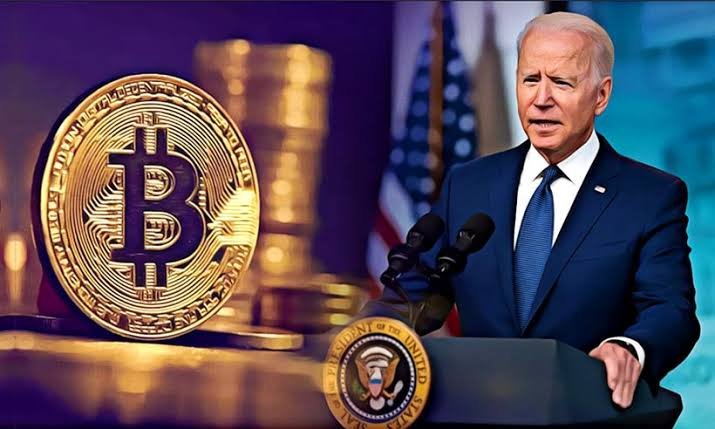As the political landscape evolves with the impending end of President Joe Biden’s current term, speculation intensifies around potential candidates for his replacement if he succumbs to pressure and decides to step down, and their stance on key issues. Among these, the regulation of cryptocurrencies stands out due to its increasing relevance in global finance […]
The post How Potential Biden Replacements Feel About Crypto Regulation appeared first on Coindoo.
As the political landscape evolves with the impending end of President Joe Biden’s current term, speculation intensifies around potential candidates for his replacement if he succumbs to pressure and decides to step down, and their stance on key issues.
Among these, the regulation of cryptocurrencies stands out due to its increasing relevance in global finance and its potential impacts on regulatory and economic policies worldwide. Added to this, the best crypto presales have to be considered. We have already seen the huge success of some cryptocurrencies like Bitcoin and Ethereum, but presale coins have not yet proven their worth. However, successful presales in crypto can generate substantial gains, as they begin life as micro-cap projects, so it will be interesting to see what the future president has to say about crypto regulations.
-----Cryptonews AD----->>>Sign up for a Bybit account and claim exclusive rewards from the Bybit referral program! Plus, claim up to 6,045 USDT bonus at . https://www.bybit.com/invite?ref=PAR8BE
<<<-----Cryptonews AD-----
Kamala Harris
Vice President Kamala Harris, while not outspoken on cryptocurrencies, has been part of an administration that initiated steps toward establishing a regulatory framework aimed at protecting consumers and encouraging innovation in the crypto space. If Harris were to run for president, it is anticipated that she might maintain a similar course but possibly adapt the regulatory measures to keep pace with the rapid advancement of financial technologies.
Pete Buttigieg
Pete Buttigieg, currently serving as the Secretary of Transportation and known for his progressive views on technology, may offer a more forward-thinking approach to cryptocurrency. He has shown interest in the potential of blockchain technology and the importance of integrating cryptocurrencies within a clear regulatory framework that supports national economic interests while safeguarding against risks.
Elizabeth Warren
Senator Elizabeth Warren has been explicit about her concerns regarding cryptocurrencies. She argues for stringent regulations, as there is in other parts of the world, to mitigate risks such as fraud, market instability, and the environmental impact of mining digital currencies. Warren’s advocacy for tight control suggests that, under her leadership, the U.S. might see a more aggressive regulatory environment aimed at curbing the freewheeling nature of crypto markets.
Bernie Sanders
Bernie Sanders has voiced concerns over cryptocurrencies exacerbating economic inequality. His approach to regulation would likely aim to protect consumers and ensure that the wealth generated by digital currencies does not lead to greater disparities. Sanders’ stance might lead to a regulatory framework that, while protective of consumers, could impose significant restrictions on how cryptocurrencies operate in the U.S.
Cory Booker
Senator Cory Booker, another potential candidate, has shown interest in the technological innovation brought by cryptocurrencies but emphasizes the need for balanced regulations that protect consumers without stifling innovation. Booker’s views suggest a potentially moderate approach that seeks to harness the benefits of crypto while addressing the inherent risks.
Hillary Clinton
Hillary Clinton has expressed skepticism about the unchecked growth of cryptocurrency markets. She has previously pointed out the potential for cryptocurrencies to undermine traditional currencies and the stability of financial markets. Clinton’s policy might focus on tight regulatory frameworks that protect against potential threats to national security and economic stability from the volatile nature of digital currencies.
Implications of Crypto Policies for Financial Markets
The varying positions on cryptocurrency regulation among potential presidential candidates are not just academic or isolated policy stances. They have real-world implications for the financial markets, influencing everything from the stability of the crypto financial system to the innovation within fintech sectors.
The next president’s approach to crypto regulation could determine the level of investor confidence, the global positioning of the U.S. as a leader or a cautious observer in the burgeoning crypto market, and the competitive edge of U.S. companies in global markets. This could also affect how quickly new financial technologies are adopted and integrated into the mainstream economy, potentially shaping the economic landscape for years to come.
Conclusion
The various stances of potential presidential candidates on cryptocurrency regulation highlight a critical debate that will likely play a significant role in the upcoming elections. As these political figures define their positions, the cryptocurrency community and stakeholders are watching closely, recognizing that the future regulatory landscape will significantly impact the industry’s growth and stability. Just as gamblers continue to weigh their odds in real money online casinos, many of which now ironically also accept crypto, so too are investors and enthusiasts gauging the political landscape to predict how it might reshape the regulatory framework for cryptocurrencies in the U.S.
The post How Potential Biden Replacements Feel About Crypto Regulation appeared first on Coindoo.






